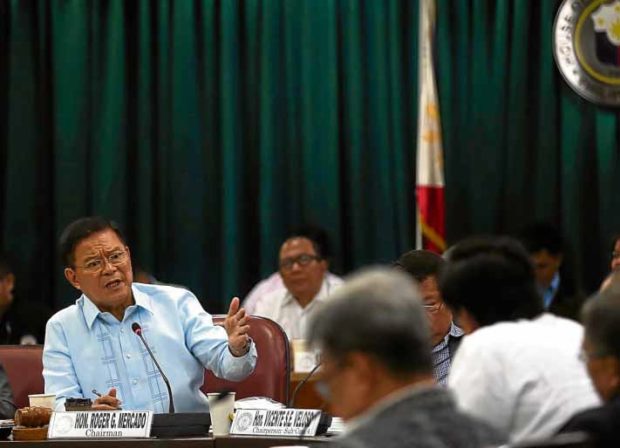
CHARTER REVISIONS Rep. Roger Mercado, chair of the House committee on constitutional amendments, on Tuesday leads discussions on the proposed revisions to the 1987 Charter. LYN RILLON
The House of Representatives on Tuesday adopted constituent assembly (Con-ass) as the mode for amending the 1987 Constitution for a switch to federalism.
By a voice vote, the 293-member chamber approved Concurrent Resolution No. 9 “to constitute the Congress of the Philippines as a constituent assembly for the purpose of proposing amendments to, or revision of, the 1987 Constitution.”
Lawmakers from the Makabayan bloc led by Anakpawis Rep. Ariel Casilao and ACT Teachers Rep. Antonio Tinio tried to stop the vote and loudly voiced objections.
But the presiding officer, Deputy Speaker Gwendolyn Garcia, dismissed the objections and put the measure to a vote.
The ayes drowned out the nays, though a considerable number of lawmakers also voted in the negative.
Lawmakers forever
Earlier on Tuesday, a number of House leaders tried to clear the way for limitless terms for members of the envisioned parliament in the proposed federal government.
Among the proponents is the chair of the House constitutional amendments committee, who opened discussions on a draft Constitution that is based on the output of four subcommittees that have consolidated federal models in the past several weeks.
The panel headed by Southern Leyte Rep. Roger Mercado began debating the salient features of the subcommittees’ proposals that borrowed from models suggested by the PDP-Laban Federalism Institute and Resolution of Both Houses No. 8, a draft Constitution proposed by two House members.
A final draft of the proposed Constitution will be submitted to Congress once it sits as a Con-ass.
The subcommittees recommended that the President, along with members of parliament, be given a five-year term with one reelection, serving no more than two consecutive terms.
But the discussion set off proposals from members of the House panel to do away with term limits altogether.
Contentious debate
Davao Oriental Rep. Corazon Nuñez-Malanyaon, who headed a subcommittee on government structure, said there was a contentious debate among the members during the deliberation on term limits.
“I remember there was a heated discussion on this. There were those proposing there should be no term limits while others wanted only two consecutive terms,” she said.
To which Ako Bicol Rep. Rodel Batocabe objected: “What [do we] fear? What is the thing we would like to avoid?”
Mercado, the committee chair, said: “[Nothing]. It’s just that based on our experience, there was a time our elected officials with terms of four years had no term limit. Here we are now to make proposals for consequent amendments in order that these things be reconciled.”
He then said he was in favor of dispensing with term limits for lawmakers.
Quirino Rep. Dakila Carlo Cua, chair of the House ways and means committee, agreed, saying he, too, believed term limits should be removed.
At present, House members have three-year terms and are allowed no more than three consecutive terms, while senators who serve six years are limited to two successive terms.
Alejano not comfortable
In a press briefing, Magdalo Rep. Gary Alejano said he was not comfortable with the proposal.
“We all know that the faces of politicians are all the same … No term limit is good if the people elect only those who are qualified, but our people are still far from that stage,” he said.
“I really don’t know how this will work because the likely scenario is that politicians will be in power until [they die],” Alejano said.
Ifugao Rep. Teddy Baguilat Jr. said he was open to discussing the prospect of doing away with term limits with the caveat that such a provision should not benefit incumbents.
“It should be made clear that this [would] not apply to us,” he said.